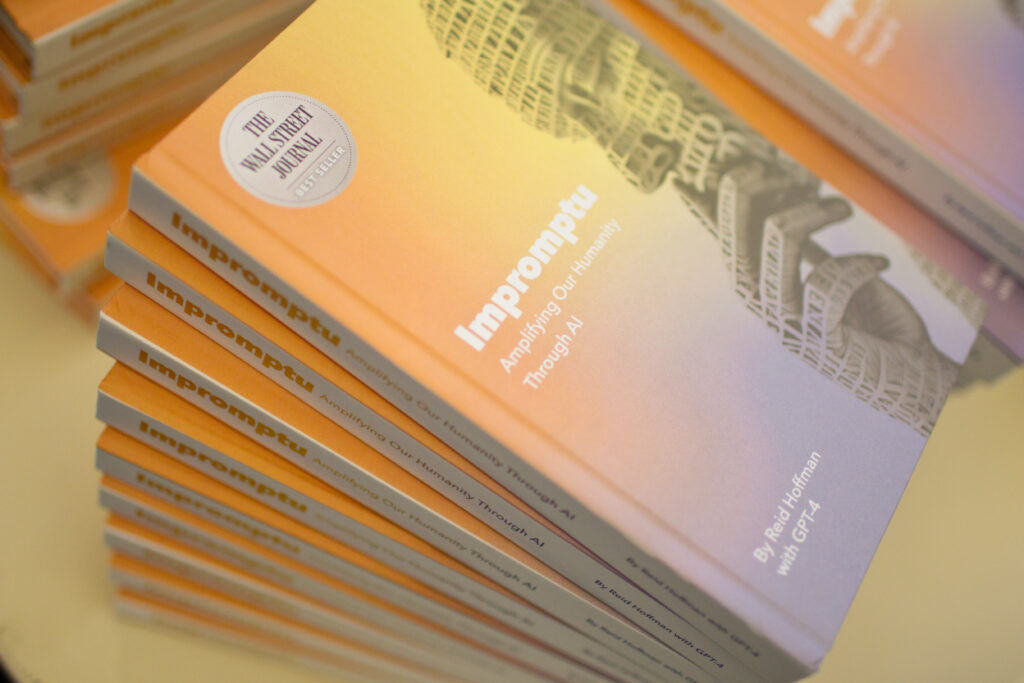
Is AI a threat to humanity or a partner with the power to unlock our full potential? Over 70% of the CHM Live audience polled at a recent event is excited about the potential of AI. So is Reid Hoffman, cofounder of Inflection AI and former board member of OpenAI. He shared his insights and hopes for the future at CHM in a wide-ranging conversation with Anne Dwane of Village Global.
Expanding on key issues from his new book, Impromptu: Amplifying Our Humanity Through AI, cowritten with AI chatbot GPT-4, Hoffman noted that while AI is often seen as a threat, it can also amplify whatever we create to elevate humanity. Imagine a medical assistant on every smartphone or a tutor for every age on every subject. It may be an existential risk, but AI may also be the only thing that can help solve pandemics or climate change.

Impromptu is Reid Hoffman's latest book, cowritten with GPT-4.
Hoffman describes himself as a techno-optimist rather than a techno-utopian. He also believes the term “homo techne” should replace “homo sapiens” to reflect how humans have evolved through their technology: fire, the wheel, the printing press, electricity, and now AI. We must go beyond the fear of new technology so that we can shape it, because it in turn shapes us.
Working with chatbot GPT-4 to write a book was “amazing and delightful,” says Hoffman. Focusing on current discourse around AI, he explored how it could help us to become more human.
Reid Hoffman describes writing with GPT-4.
Hoffman says the book can provide ideas about how to use prompting to get results from GPT-4. He recommends trying it out for something that matters to you. You just might be surprised.
Technologists tend to worry about super-intelligent robots, Hoffman notes, rather than the more real threat of AI used by terrorists or criminals. We must put guardrails around AI to prevent that kind of misuse of its intelligence.
Anyone who has talked with a chatbot knows it can deliver on providing information. Sympathy or helpful advice? Not so much. Inflection AI, cofounded by Hoffman, has created PI, which stands for "Personal AI," is designed to be a new class of AI—one with emotional intelligence that he hopes can help us solve problems along the way to becoming more of who aspire to be as human beings. AI’s access to information to solve problems has great potential.
Reid Hoffman describes how AI can solve problems.
The audience was most concerned about AI in journalism and information, and most excited about its possibilities for work, the economy, and education. Hoffman shares concerns about journalism and worries that AI can help hackers like the Russians use open-source models to spread dissent and discord during the 2024 election. He believes that AI itself can help to deal with the disruption it will cause for workers. And, AI can help make education and tutoring more widely available, as well as improve other areas of social justice.
Reid Hoffman explains how AI can help counteract bias.
AI will change many jobs and certainly displace some people. For example, trucks cause 40,000 deaths per year in the US, and AI can get that number down to 1,000 with autonomous drivers. In other jobs, the hope is that AI can take on more of the “boring” rote work while humans focus on the more interesting and creative elements. Teachers would be freed to spend more time with individual students, for instance. And we’ll need AI to fill gaps when the Boomers retire.
So what will we do if AI relieves us of so much work? Hoffman isn’t worried about the “overabundance utopia.” Looking 10 years into the future, he believes we'll all have a personal intelligence assistant to help us navigate many aspects of our lives. We will use AI devices for drug discovery and medicine at a speed and quality we've never seen before. And, perhaps AI will have helped us make a dent in climate change. Deep Mind saved Google 15% when it analyzed suggested reconfiguring electricity flows for all the company's data centers. If we apply that kind of analysis to all buildings, city grids, and power utilization, AI might just save humanity.
Want to learn more? Download Impromptu for free.
AI + Humanity | CHM Live, October 30, 2023
Blogs like these would not be possible without the generous support of people like you who care deeply about decoding technology. Please consider making a donation.